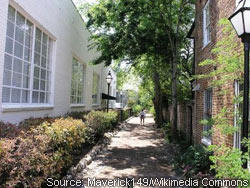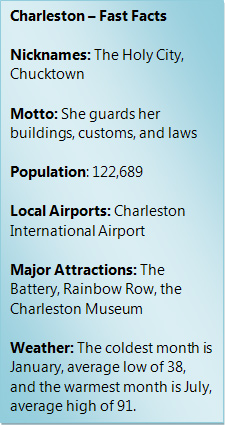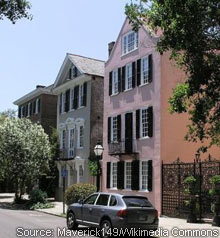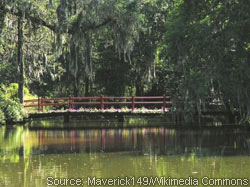 With roughly 4.51 million visitors generating an annual economic brunt of $3.22 billion, Charleston, South Carolina proves people love to ponder the past in the province.
With roughly 4.51 million visitors generating an annual economic brunt of $3.22 billion, Charleston, South Carolina proves people love to ponder the past in the province.
But don't let all that talk of history lead you to believe the modern city is not the hub of the most hip happenings in the second-largest and oldest city in the state. The Charleston County seat and principal city in the metropolitan area may reflect historic edifices, but is very much a contemporary community of art galleries, orchestras, theaters, museums and more.
Titled "America's Most Friendly City" by Travel + Leisure, and "The Most Polite and Hospitable City in America" by Southern Living, the locale breeds contagious kindness among kin and neighbors alike. If you have ever considered moving to the sweet southern state, take a moment to reflect on the Charleston region and all it has to offer you and your family.
Charleston Climate
The sector has never seen a hurricane as damaging as Hugo in 1989, however, raging storms still threaten both the summer and fall seasons. The same humid sub-tropical climate that leaves locals trying to cool off during the hot, humid summers brings them relief during the mild winters. The region sees a significant amount of rain during 106 days of the year and a generous amount of sunshine 206 days annually. The coldest month is January, average low of 38, and the warmest month is July, average high of 91.
Charleston Neighborhoods
 Six distinct areas, Downtown, West Ashley, John, James and Daniel Islands and Cainhoy Peninsula, make up the 147-square mile municipality. Though Charleston has more than 122,000 locals living in the region, the Charleston-North Charleston-Summerville Metropolitan Statistical Area has almost 665,000 residents in the three adjacent counties of Charleston, Berkeley and Dorchester. Saturated in history, stories of survival go back as far as 1690. Struck by pirates and foreign assailants, the once walled citadel prevailed the attacks to became one of the richest New World cities. As mansions and plantations popped up everywhere, an affluent social class began to lead the locale and presently still rules the area's thriving economy.
Six distinct areas, Downtown, West Ashley, John, James and Daniel Islands and Cainhoy Peninsula, make up the 147-square mile municipality. Though Charleston has more than 122,000 locals living in the region, the Charleston-North Charleston-Summerville Metropolitan Statistical Area has almost 665,000 residents in the three adjacent counties of Charleston, Berkeley and Dorchester. Saturated in history, stories of survival go back as far as 1690. Struck by pirates and foreign assailants, the once walled citadel prevailed the attacks to became one of the richest New World cities. As mansions and plantations popped up everywhere, an affluent social class began to lead the locale and presently still rules the area's thriving economy.
Registering Your Car
You must obtain a South Carolina license and registration after 90 days of residency in the state. Some forms of required identification new residents can use to obtain the two permits are a Social Security card, check card, military ID and marriage license. To find out more information and all the requirements needed for both a registration and license, visit the South Carolina Division of Motor Vehicles.
Charleston Schools
The Charleston County School District, serving 46,000 students in 84 schools, educates most of the city youth; however, some children are trained in the Berkeley County School District. Specialized, independent and religious-based campuses in the area include Charleston Day School, First Baptist Church School and Palmetto Christian Academy. As for post-secondary sites, the College of Charleston and the Citadel, a prominent military college, are two popular community campuses. Other notable sites in town are the Charleston School of Law and the Medical University of South Carolina.
Charleston Employment
South Carolina Ports Authority is part of the fourth-largest container seaport on the East Coast and is one of the city's leading sources of revenue behind tourism. Leading the economy, the harbor is surrounded by lavish hotels, restaurants and upscale shops, making retail another popular trade in the province. Education also employs thousands who make a good living on the local campuses. With a 5.3 percent unemployment rate and aggressive sector budget planning, the province only promises to become more financially appealing in the future for locals and new residents alike.
Living Costs in the City
Coming in with a 2.3 percent lower cost of living than the national average and the aforementioned unemployment rate, the municipality makes a generous offer to prospective residents who are considering the region. CNN Money reports a median family income of $65,113 and a median home price at $212,000. If you want to settle down in the sector and are looking to rent a residence rather than own a piece of property, a one-bedroom unit begins at around $800 a month. Of course, more lavish living in a more luxurious location will cost you, with some one-bedroom apartments priced at a minimum of $1,500. As for utilities, the cost of services greatly varies on family size and usage.
Charleston Moving Resources
Moving and storage companies are ready and willing to help you with your move to Charleston, whether you're moving from out of state or from another county in South Carolina. Make sure you get estimates from multiple moving services before you commit to hiring any (at least three estimates). Check back to our guides for tips on how to choose your moving service wisely with important questions to ask, differentiating between types of estimates, and mistakes to avoid. Visit the following pages at Movers.com to get quotes for the following services:
Charleston Transportation
 Interstate I-26 and I-526 are two major roadways motorists travel in the region, and U.S. Routes 17 and 52 are also driven by locals who get around town via their own vehicle. As for those who prefer someone else driving, the Charleston Area Regional Transportation Authority picks up and drops off residents and visitors all throughout the region. When it comes time to flying in and out of the area, locals use the Charleston International Airport landing strip to get them to where they need to go.
Interstate I-26 and I-526 are two major roadways motorists travel in the region, and U.S. Routes 17 and 52 are also driven by locals who get around town via their own vehicle. As for those who prefer someone else driving, the Charleston Area Regional Transportation Authority picks up and drops off residents and visitors all throughout the region. When it comes time to flying in and out of the area, locals use the Charleston International Airport landing strip to get them to where they need to go.
Culture & Contemporary Life
Charleston culture is filled with southern charm that attracts millions of visitors each year. In the notably historic city spread with 18th century plantation homes, locals live a simple life, enjoying church, theater, city markets and more. You can always find residents enjoying one another at any one of the 120 parks laid out over roughly 1,806 acres in the area. The most popular park in town, Waterfront Park, is eight acres alongside the harbor adorned with gorgeous garden rooms, flowing fountains, luscious lawns, wooden swings, picnic areas and more. The music scene also brings the community closer together and has since the early development of jazz that sprang up out of the sector. Needless to say, there is never a moment to spare when immersed in the South Carolina culture.
Charleston Relocation Tips
- Save time, gas and mileage by flying into Charleston. With the right automobile mover, you can be rest assured your vehicle will arrive safely on ground as you soar through the air.
- Don't forget to check the shipment and filing claimsso you can readily keep track of all of your belongings before, during and after the move.
- No matter where you live, you never have enough storage, hence, finding a storage facility in Charleston is an immediate must.